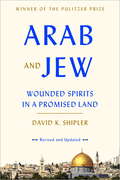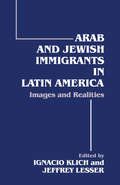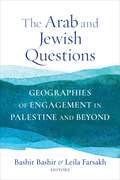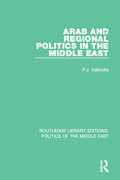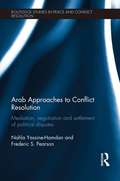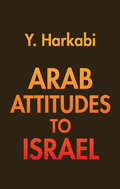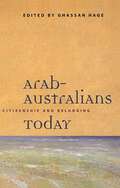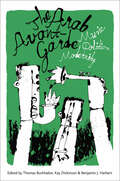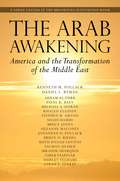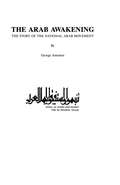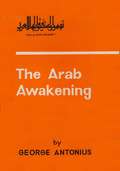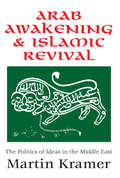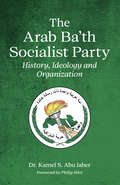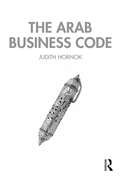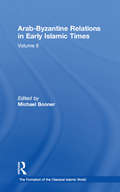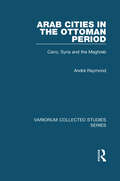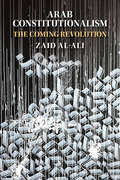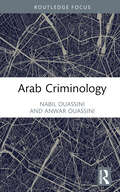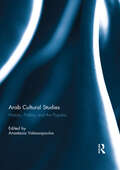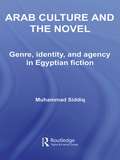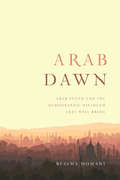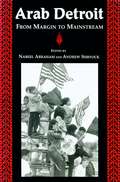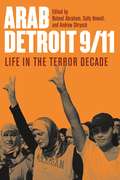- Table View
- List View
Arab and Jew: Wounded Spirits in a Promised Land
by David K. ShiplerThe expanded and updated edition of David Shipler's book that examines the relationship, past and present, between Arabs and Jews<P><P> In this monumental work, extensively researched and more relevant than ever, David Shipler delves into the origins of the prejudices that exist between Jews and Arabs that have been intensified by war, terrorism, and nationalism.<P> Focusing on the diverse cultures that exist side by side in Israel and Israeli-controlled territories, Shipler examines the process of indoctrination that begins in schools; he discusses the far-ranging effects of socioeconomic differences, historical conflicts between Islam and Judaism, attitudes about the Holocaust, and much more. And he writes of the people: the Arab woman in love with a Jew, the retired Israeli military officer, the Palestinian guerrilla, the handsome actor whose father is Arab and whose mother is Jewish.<P> For Shipler, and for all who read this book, their stories and hundreds of others reflect not only the reality of "wounded spirits" but also a glimmer of hope for eventual coexistence in the Promised Land.<P> Pulitzer Prize winner
Arab and Jewish Immigrants in Latin America: Images and Realities
by Jeffrey Lesser Ignacio KlichThis collection of essays addresses various aspects of Arab and Jewish immigration and acculturation in Latin America. The volume examines how the Latin American elites who were keen to change their countries' ethnic mix felt threatened by the arrival of Arabs and Jews.
The Arab and Jewish Questions: Geographies of Engagement in Palestine and Beyond (Religion, Culture, and Public Life #39)
by Bashir Bashir Leila FarsakhNineteenth-century Europe turned the political status of its Jewish communities into the “Jewish Question,” as both Christianity and rising forms of nationalism viewed Jews as the ultimate other. With the onset of Zionism, this “question” migrated to Palestine and intensified under British colonial rule and in the aftermath of the Holocaust. Zionism’s attempt to solve the “Jewish Question” created what came to be known as the “Arab Question,” which concerned the presence and rights of the Arab population in Palestine. For the most part, however, Jewish settlers denied or dismissed the question they created, to the detriment of both Arabs and Jews in Palestine and elsewhere.This book brings together leading scholars to consider how these two questions are entangled historically and in the present day. It offers critical analyses of Arab engagements with the question of Jewish rights alongside Zionist and non-Zionist Jewish considerations of Palestinian identity and political rights. Together, the essays show that the Arab and Jewish questions, and the Israeli-Palestinian conflict in which they have become subsumed, belong to the same thorny history. Despite their major differences, the historical Jewish and Arab questions are about the political rights of oppressed groups and their inclusion within exclusionary political communities—a question that continues to foment tensions in the Middle East, Europe, and the United States. Shedding new light on the intricate relationships among Orientalism, anti-Semitism, Islamophobia, colonialism, and the impasse in the Israeli-Palestinian conflict, this book reveals the inseparability of Arab and Jewish struggles for self-determination and political equality.Contributors include Gil Anidjar, Brian Klug, Amal Ghazal, Ella Shohat, Hakem Al-Rustom, Hillel Cohen, Yuval Evri, Derek Penslar, Jacqueline Rose, Moshe Behar, Maram Masarwi, and the editors, Bashir Bashir and Leila Farsakh.
Arab and Regional Politics in the Middle East (Routledge Library Editions: Politics of the Middle East #1)
by P.J. VatikiotisThree main themes are explored in this book, first published in 1984: the first is the problem of religion and politics as a major and long-standing preoccupation of Middle-easterners or Arab Muslims themselves; the second is that of the conflict-ridden inter-Arab and regional politics, approached largely from a local rather than an international perspective; the third deals with Egypt. The book also enquires into the nature of rule and regimes in the Middle East, the basis of authority and the arrangements for the organisation, exercise and use of power. Drawing examples from Egypt and the Fertile Crescent, the emphasis is on the relation between tradition and politics, historical evolution and state policy, domestic factors and external constraints.
Arab Approaches to Conflict Resolution: Mediation, Negotiation and Settlement of Political Disputes (Routledge Studies in Peace and Conflict Resolution)
by Nahla Yassine-Hamdan Frederic S PearsonThis book examines Arab approaches to mediation, negotiation and settlement of political disputes. This book proposes that two clusters of independent variables are potentially responsible for the distinctive nature of Arab conflict resolution. Firstly, those linked with Arab political regimes and imperatives, and secondly those linked with Arab and /or Islamic culture. The text also focuses on the Arab League and its history of involvement in crisis and conflict situations, along with the roles of individual leaders, emissaries and extra-regional actors such as IGOs (Inter-Governmental Organisations) in undertaking mediation initiatives. IGO and Arab League activity has taken on new importance since the various intervention attempts in connection with the 'Arab Spring' since 2011. During the negotiation process, most Arab regimes tend to view conflicts within a broad historical context and Islamic culture prioritises the cohesion of the community and internal stability of the state over individual autonomy. This has created an authoritarian style of leadership, and in practice, leaders in the Middle East have had near absolute authority in the decision-making process—a fact which will have a lot of weight in conflict management and whether peace will endure for a long period of time. This book is unique in studying these clusters through comparative systematic case study analysis of events prior to and subsequent to the 'Arab Spring', augmented by a quantitative analysis of sample data on Arab disputes, compiled from a larger and newly augmented study comprising the years 1945-2000. Complementary data from the Uppsala Conflict Data Program’s (UCDP) data base of armed conflicts since 1975 is also utilized. This book will be of much interest to students of conflict resolution, peace and conflict studies, Middle Eastern politics and IR in general.
Arab Attitudes to Israel
by Yehoshafat HarkabiBecause of recent changes in the explicitly declared goals of Arabs in the Palestinian conflict, this book is of singular importance, and no scholar or expert on Middle East affairs can afford to ignore it. This work, by a scholar described as "the doyen of Israeli Arabists," is the result of vast research into the attitude of the Arabs toward Israel, manifested both in their declared, explicit aims and in ideological exegeses on the roots of the Palestinian problem. Approximately one hundred twenty books written by Arabs and the Arab press and radio are herein analyzed. Harkabi's searching examination is objective. His detection of consistent patterns in what at first seems amorphous is convincing. If there is such a thing as a science of political psychology, Harkabi is its master.
Arab-Australians Today: Citizenship and Belonging
by Ghassan HageArab people first came to Australia in the late nineteenth century. Today more than half a million Australians claim some form of Arab ancestry.They are a diverse group, both socially and economically. New South Wales, for example, appointed Australia's first Lebanese Governor, while at the same time it was labelling groups of economically deprived young people as 'Lebanese gangs'. Victoria's Premier, Steve Bracks, comes from a Lebanese background. Melbourne has an important Arab business community, while newly arrived Arab immigrants have one of the highest rates of unemployment in the country.Arab-Australians Today raises important questions about immigration, settlement, marginalisation and participation in Western societies. It discusses the way early Arab immigrants were received in Australia and talks about contemporary issues of participation in the Australian political process. It examines the lives of diverse groups of people, ranging from entrepreneurs to Arab women activists to unemployed youth. It analyses issues ranging from the ways Arab-Australians grow to call Australia home, to the moral panic created around Arab youth and criminality.The book offers non-Arab-Australians a way to better understand the Arab presence in Australia. It is also an invitation for Arab-Australians to reflect on the history of their settlement in Australia, as well as on the current experience of more recent immigrants.
The Arab Avant-Garde: Music, Politics, Modernity (Music Culture)
by Thomas Burkhalter, Kay Dickinson, and Benjamin J. HarbertThe first in-depth study of diverse and radical innovation in Arab music From jazz trumpeters drawing on the noises of warfare in Beirut to female heavy metallers in Alexandria, the Arab culture offers a wealth of exciting, challenging, and diverse musics. The essays in this collection investigate the plethora of compositional and improvisational techniques, performance styles, political motivations, professional trainings, and inter-continental collaborations that claim the mantle of "innovation" within Arab and Arab diaspora music. While most books on Middle Eastern music-making focus on notions of tradition and regionally specific genres, The Arab Avant Garde presents a radically hybrid and globally dialectic set of practices. Engaging the "avant-garde"—a term with Eurocentric resonances—this anthology disturbs that presumed exclusivity, drawing on and challenging a growing body of literature about alternative modernities. Chapters delve into genres and modes as diverse as jazz, musical theatre, improvisation, hip hop, and heavy metal as performed in countries like Iraq, Egypt, Lebanon, Syria, Palestine, and the United States. Focusing on multiple ways in which the "Arab avant-garde" becomes manifest, this anthology brings together international writers with eclectic disciplinary trainings—practicing musicians, area studies specialists, ethnomusicologists, and scholars of popular culture and media. Contributors include Sami W. Asmar, Michael Khoury, Saed Muhssin, Marina Peterson, Kamran Rastegar, Caroline Rooney, and Shayna Silverstein, as well as the editors.
The Arab Awakening: America and the Transformation of the Middle East
by Akram Al-Turk Daniel L. Byman Kenneth M. Pollack Michael S. Doran Pavel BaevEven the most seasoned Middle East observers were taken aback by the events of early 2011. Protests born of oppression and socioeconomic frustration erupted throughout the streets; public unrest provoked violent police backlash; long-established dictatorships fell. How did this all happen? What might the future look like, and what are the likely ramifications for the United States and the rest of the world? In The Arab Awakening, experts from the Brookings Institution tackle such questions to make sense of this tumultuous region that remains at the heart of U.S. national interests.The first portion of The Arab Awakening offers broad lessons by analyzing key aspects of the Mideast turmoil, such as public opinion trends within the "Arab Street"; the role of social media and technology; socioeconomic and demographic conditions; the influence of Islamists; and the impact of the new political order on the Arab-Israeli peace process.The next section looks at the countries themselves, finding commonalties and grouping them according to the political evolutions that have (or have not) occurred in each country. The section offers insight into the current situation, and possible trajectory of each group of countries, followed by individual nation studies. The Arab Awakening brings the full resources of Brookings to bear on making sense of what may turn out to be the most significant geopolitical movement of this generation. It is essential reading for anyone looking to understand these developments and their consequences.
Arab Awakening: The Story Of The Arab National
by AntoniusFirst published in 2001. Routledge is an imprint of Taylor & Francis, an informa company.
The Arab Awakening: The Story Of The Arab National Movement
by George AntoniusThis remarkable book on a complex and controversial subject is widely regarded as the best full account of the rise of the Arab national movement. After several years of travel and research in all parts of the Arab world, the author managed to gain access to all the relevant material necessary to the writing of a book such as this-much of the material having been unavailable to other writers on the subject. The fruits of Mr. Antonius' research have been embodied in this unique story of the origins and development of the national movement from its earliest beginnings in the nineteenth century down to the post-World War I era. In addition to the narrative account and assessments of military and political leaders, including Lawrence of Arabia, the book contains a set of documents of fundamental importance to the history of the Arab revival."Never has the story of the origin and growth of the Arab national movement been told with such brilliance or with such a wealth of detail."--The Nation"A good book written by a scholar, an expert on the subject and a resident in the country.... A very excellent and extremely able book." -- The Observer, London"The whole of this brilliantly written book moves at the same plane of objective and critical scholarship." --Daily Telegraph, London
The Arab Awakening
by Kenneth M. Pollack Daniel L. Byman Michael S. Doran Pavel Baev Akram Al-TurkEven the most seasoned Middle East observers were taken aback by the events of early 2011. Protests born of oppression and socioeconomic frustration erupted throughout the streets; public unrest provoked violent police backlash; long-established dictatorships fell. How did this all happen? What might the future look like, and what are the likely ramifications for the United States and the rest of the world? In The Arab Awakening, experts from the Brookings Institution tackle such questions to make sense of this tumultuous region that remains at the heart of U.S. national interests.The first portion of The Arab Awakening offers broad lessons by analyzing key aspects of the Mideast turmoil, such as public opinion trends within the "Arab Street"; the role of social media and technology; socioeconomic and demographic conditions; the influence of Islamists; and the impact of the new political order on the Arab-Israeli peace process.The next section looks at the countries themselves, finding commonalties and grouping them according to the political evolutions that have (or have not) occurred in each country. The section offers insight into the current situation, and possible trajectory of each group of countries, followed by individual nation studies. The Arab Awakening brings the full resources of Brookings to bear on making sense of what may turn out to be the most significant geopolitical movement of this generation. It is essential reading for anyone looking to understand these developments and their consequences.
The Arab Awakening: America and the Transformation of the Middle East
by Ibrahim Sharqieh Suzanne Maloney Khaled Elgindy Michael S. Doran Jonathan D. Pollack Bruce Jones Kenneth M. Pollack Daniel L. Byman Sarah E. Yerkes Shibley Telhami Stephen R. Grand Pavel Baev Mer Taspinar Salman Shaikh Akram Al-Turk Shadi Hamid Bruce O. Riedel Ruth Hanau SantiniEven the most seasoned Middle East observers were taken aback by the events of early 2011. Protests born of oppression and socioeconomic frustration erupted throughout the streets; public unrest provoked violent police backlash; long-established dictatorships fell. How did this all happen? What might the future look like, and what are the likely ramifications for the United States and the rest of the world? In The Arab Awakening, experts from the Brookings Institution tackle such questions to make sense of this tumultuous region that remains at the heart of U.S. national interests.The first portion of The Arab Awakening offers broad lessons by analyzing key aspects of the Mideast turmoil, such as public opinion trends within the "Arab Street"; the role of social media and technology; socioeconomic and demographic conditions; the influence of Islamists; and the impact of the new political order on the Arab-Israeli peace process.The next section looks at the countries themselves, finding commonalties and grouping them according to the political evolutions that have (or have not) occurred in each country. The section offers insight into the current situation, and possible trajectory of each group of countries, followed by individual nation studies. The Arab Awakening brings the full resources of Brookings to bear on making sense of what may turn out to be the most significant geopolitical movement of this generation. It is essential reading for anyone looking to understand these developments and their consequences.
Arab Awakening and Islamic Revival: The Politics of Ideas in the Middle East
by Thomas MolnarOver the past decade, the political ground beneath the Middle East has shifted. Arab nationalism the political orthodoxy for most of this century has lost its grip on the imagination and allegiance of a new generation. At the same time, Islam as an ideology has spread across the region, and "Islamists" bid to capture the center of politics. Most Western scholars and experts once hailed the redemptive power of Arabism. Arab Awakening and Islamic Revival is a critical assessment of the contradictions of Arab nationalism and Islamic fundamentalism, and the misrepresentation of both in the West.The first part of the book argues that Arab nationalism--the so-called Arab awakening--bore within it the seeds of its own failure. Arabism as an idea drew upon foreign sources and resources. Even as it claimed to liberate the Arabs from imperialism it deepened intellectual dependence upon the West's own romanticism and radicalism. Ultimately, Arab nationalism became a force of oppression rather than liberation, and a mirror image of the imperialism it defied. Kramer's essays together form the only chronological telling and the at fully documented postmortem of Arabism. The second part of the book examines the similar failings of Islamism, whose ideas are Islamic reworkings of Western ideological radicalism. Its effect has been to give new life to old rationales for oppression, authoritarianism, and sectarian division.Arab Awakening and Islamic Revival provides an alternative view of a century of Middle Eastern history. As the region moves fitfully past ideology, Kramer's perspective is more compelling than at any time in the past-in Western academe no less than among many in the Middle. This book will be of interest to sociologists, political scientists, economists, and Middle East specialists.
The Arab Ba'th Socialist Party: History, Ideology and Organization
by Kamel JaberThe Arab Ba'th Socialist Party was first published in 1966 by Syracuse University Press and has been revised and republished in 2024 by Hesperus Press with the original foreword by renowned Middle Eastern historian, the late Dr. Philip Hitti, Professor Emeritus of Arabic Studies at Princeton University; it also includes a preface by Professor Tareq Tell, who teaches Political Studies and the History of the Middle East at the American University of Beirut. This book covers the early years of the establishemnt of the party based on peronsal interviews with the founders. It is still considered an important reference to students as well as academics of Middle Eastern history and political ideologies, such as Arab nationalism and socialism and the Ba'th Party.
The Arab Business Code
by Judith HornokThe Gulf Cooperation Council (GCC) countries are some of the richest and most dynamic emerging markets in the world. But they are tough markets! International companies must think seriously if they want to do business there – the barriers can be numerous and difficult. But the opportunities are phenomenal and rewarding. The key to success is to plan and take the right steps. This book shows how to do this by decoding, using case studies, and suggesting relevant solutions. For Judith Hornok, it’s not about dry theories or mind games. Instead this book is based on numerous case studies drawn from the lives of well-known Arab and international business people. The reader can grasp the opportunities and avoid the pitfalls by knowing and understanding the Arab Business Code (ABC): "learning the A-B-Cs." This book offers a study with practical measures, a toolkit of easy-to-learn and simple-to-use techniques that pave the way for business success in the Gulf. Over fifteen years of research is boiled down into a clearly structured, compact book. Judith Hornok presents the insights of her studies by decoding the behavior of Arab business people in the Gulf using innovative techniques and new approaches, which can be easily implemented by the reader. For the first time Judith also presents her creations – the figures of The Seven Emotional Hinderers.
Arab-Byzantine Relations in Early Islamic Times (The Formation of the Classical Islamic World #8)
by Michael BonnerThe Byzantine Empire was the Islamic commonwealth’s first and most stubborn adversary. For many centuries it loomed large in Islamic diplomacy, military operations and commerce, as well as in Islamic representations of the world in general. Moreover, the ways in which early Muslims and Byzantines perceived one another ” both polemically and otherwise ” afterwards proved decisive for the mutual perceptions between the Islamic world and Christian Western Europe. For these and other reasons, Arab-Byzantine relations have been a major concern of modern scholarship on early Islam for well over a century. Arab-Byzantine Relations in Early Islamic Times presents some of the most important of these contributions, organized according to the following themes: war and diplomacy; frontiers and military organization; polemics and images of the 'other'; exchange, influence and convergence; and martyrdom, jihad and holy war. An introductory essay discusses these themes within the contexts of early Islamic society, politics and economy.
Arab Cities in the Ottoman Period: Cairo, Syria and the Maghreb (Variorum Collected Studies)
by André RaymondProfessor Raymond deals here with the evolution of the great Arab cities of the Ottoman period (1516-1800) - with questions of organisation, social life and the built space - looking in particular at Aleppo, Algiers, Constantine and, above all, at Cairo. These studies form part of a movement, in which the author’s work has played a significant role, aiming to re-examine the traditional Orientalist view of ’Muslim cities’. Contrary to the negative perception one so often finds, of decadent and chaotic towns, it can be seen that they had a coherent internal structure and that, far from being in decline, they enjoyed renewed prosperity in the Ottoman era, benefiting from the strength of the empire and flourishing Mediterranean trade. This in turn was reflected in the important and original architectural activity of the period.
Arab Constitutionalism: The Coming Revolution
by Zaid Al-AliAfter the 2011 uprisings started in Tunisia and swept across the Arab region, more than a dozen countries amended their constitutions, the greatest concentration of constitutional reform processes since the end of the Cold War. This book provides a detailed account and analysis of all of these developments. Individual accounts are provided of eight different reform processes (including Tunisia, Egypt, Libya, Yemen and Sudan), with particular focus on the historical context, the political dynamics, the particular process that each country followed and the substantive outcome. Zaid Al-Ali deconstructs the popular demands that were made in 2011 and translates them into a series of specific actions that would have led to freer societies and a better functioning state. A revolution did not take place in 2011, but it is inevitably part of the region's future and Arab Constitutionalism explores what that revolution could look like.
Arab Criminology (Criminology in Focus)
by Nabil Ouassini Anwar OuassiniThe objective of Arab Criminology is to establish a criminological sub-field called ‘Arab Criminology.’ The ever-evolving field of criminology has advanced in the past decade, yet many impediments remain. Unlike criminology in Africa, Asia, the Americas, Europe, and Oceania based merely on geopolitical constructs, the Arab world has unique commonalities that do not exist in the other established sub-fields on criminology. The Arab world has largely remained in criminology’s periphery despite the region’s considerable importance to current international affairs. In response, this book explores two main questions: Why should we and how do we establish a sub-field in Arab Criminology? The authors examine the state of criminology in the Arab world, define its parameters, and present four components that bond and distinguish Arab criminology from other criminological area studies. They then identify the requirements for establishing Arab criminology and detail how local, regional, and international researchers can collaborate, develop, and expand the sub-field. Arab Criminology will challenge some of the recurrent Orientalist and Islamophobic tropes in Northern criminology and progress the discipline of criminology to reflect a more diverse focus that embraces regions from the Global South. Presenting compelling arguments and examples that support the establishment of this sub-field, Arab Criminology will be of great interest to Criminology, Criminal Justice, Legal Studies, and Middle Eastern/North African studies scholars, particularly those working on Southern Criminology, Comparative Criminology, International Criminal Justice Systems, and Arab studies.
Arab Cultural Studies: History, Politics and the Popular
by Anastasia ValassopoulosThis book seeks to both showcase and further develop innovative research and debates on contemporary Arab cultural production. Popular culture in the form of cinema, popular music, literature, visual media and cyber-cultures, both local and imported, enjoy a central role in Arab cultural life, and the contributors to this innovative collection showcase the tremendous cultural output emerging from the Arab world. They present sensitive, conceptual readings whilst remaining mindful of the place of this work within a wider framework that seeks to prevent isolationist readings of cultural phenomena. Making sense of the place of culture in the Arab world, and agreeing upon a broadly recognisable and commonly accepted set of terms within which to discuss this output, is a new and urgent challenge. Arab Cultural Studies aspires to understand, communicate and theorise these forms. This book was originally published as a special issue of the Journal for Cultural Research.
Arab Culture and the Novel: Genre, Identity and Agency in Egyptian Fiction (Routledge Studies in Middle Eastern Literatures #Vol. 16)
by Muhammad SiddiqThis book explores the complex relationship between the novel and identity in modern Arab culture against a backdrop of contemporary Egypt. It uses the example of the Egyptian novel to interrogate the root causes – religious, social, political, and psychological – of the lingering identity crisis that has afflicted Arab culture for at least two centuries.
Arab Dawn
by Bessma MomaniIn the West, news about the Middle East is dominated by an endless stream of reports and commentary about civil war, sectarian violence, religious extremism, and economic stagnation. But do they tell the full story? For instance, who knew that university enrolment in the war-torn Palestinian territories exceeds that of Hong Kong, or that more than a third of Lebanese entrepreneurs are women?Change is on its way in the Middle East, argues Bessma Momani, and its cause is demographic. Today, one in five Arabs is between the ages of fifteen and twenty-four. Young, optimistic, and increasingly cosmopolitan, their generation will shape the region's future. Drawing on interviews, surveys, and other research conducted with young people in fifteen countries across the Arab world, Momani describes the passion for entrepreneurship, reform, and equality among Arab youth. With insightful political analysis based on the latest statistics and first-hand accounts, Arab Dawn is an invigorating study of the Arab world and the transformative power of youth.
Arab Detroit: From Margin to Mainstream
by Nabeel Abraham Andrew ShryockMetropolitan Detroit is home to one of the largest, most diverse Arab communities outside the Middle East, yet the complex world Arabic-speaking immigrants have created there is barely visible on the landscape of ethnic America. In this volume, Nabeel Abraham and Andrew Shryock bring together the work of twenty-five contributors to create a richly detailed portrait of Arab Detroit. The book goes behind the bulletproof glass in Iraqi Chaldean liquor stores. It explores the role of women in a Sunni mosque and the place of nationalist politics in a Coptic church. It follows the careers of wedding singers, Arabic calligraphers,restaurant owners, and pastry chefs. It examines the agendas of Shia Muslim activists and Washington-based lobbyists and looks at the intimate politics of marriage, family honor, and adolescent rebellion. Memoirs and poems by Lebanese, Chaldean, Yemeni, and Palestinian writers anchor the book in personal experience, while over fifty photographs provide a backdrop of vivid, often unexpected, images. In their efforts to represent an ethnic/immigrant community that is flourishing on the margins of pluralist discourse, the contributors to this book break new ground in the study of identity politics, transnationalism, and diaspora cultures.
Arab Detroit 9/11: Life in the Terror Decade
by Andrew Shryock Nabeel Abraham Sally HowellSince the terrorist attacks of September 11, 2001, Detroit's large and nationally prominent Arab and Muslim communities have faced heightened prejudice, government surveillance, and political scapegoating, yet they have also enjoyed unexpected gains in economic, political, and cultural influence. Museums, festivals, and cultural events flourish alongside the construction of new mosques and churches, and more Arabs are being elected and appointed to public office. Detroit's Arab population is growing even as the city's non-Arab sectors, and the state of Michigan as a whole, have steadily lost population. In Arab Detroit 9/11: Life in the Terror Decade, a follow-up to their volume Arab Detroit: From Margin to Mainstream (Wayne State University Press, 2000), editors Nabeel Abraham, Sally Howell, and Andrew Shryock present accounts of how life in post-9/11 Detroit has changed over the last ten years.Abraham, Howell, and Shryock have assembled a diverse group of contributors whose essays range from the scholarly to the artistic and include voices that are Palestinian, Iraqi, Yemeni, and Lebanese; Muslim and Christian; American born and immigrant. The book is divided into six sections and begins with wide-angle views of Arab Detroit, looking first at how the community fits within greater Detroit as a whole, then presenting closer portraits of Arab Detroit's key ethnonational and religious subgroups. More personal, everyday accounts of life in the Terror Decade follow as focus shifts to practical matters such as family life, neighborhood interactions, going to school, traveling domestically, and visiting home countries. Finally, contributors consider the interface between Arab Detroit and the larger society, how this relationship is maintained, how the War on Terror has distorted it, and what lessons might be drawn about citizenship, inclusion, and exclusion by situating Arab Detroit in broader and deeper historical contexts.Readers interested in Arab studies, Detroit culture and history, transnational politics, and the changing dynamics of race and ethnicity in America will enjoy the personal reflection and analytical insight of Arab Detroit 9/11.
